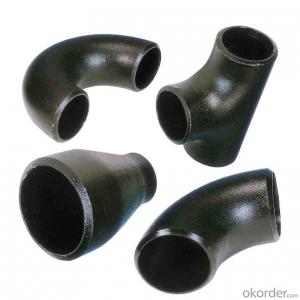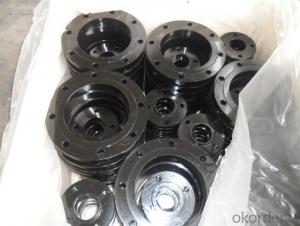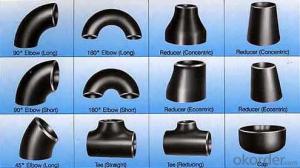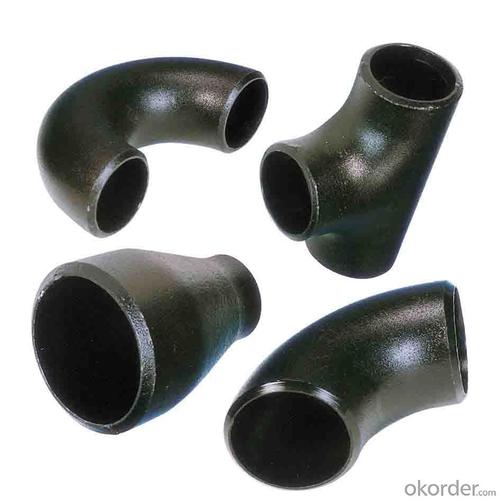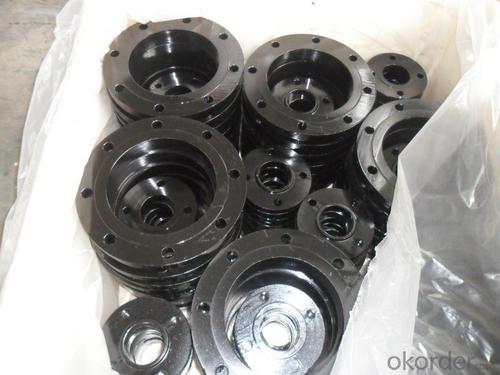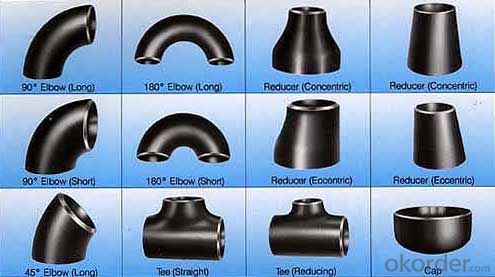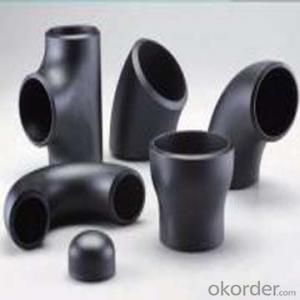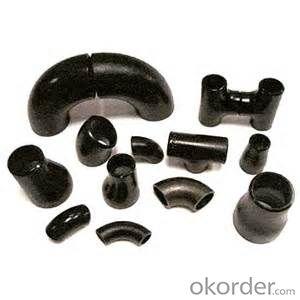CARBON STEEL PIPE FITTINGS ASTM A234 TEE 3''
- Loading Port:
- Tianjin
- Payment Terms:
- TT OR LC
- Min Order Qty:
- 5 m.t.
- Supply Capability:
- 30000 m.t./month
OKorder Service Pledge
OKorder Financial Service
You Might Also Like
Specifications
1.we produce seamless steel pipe
2.size:48-219*4.5-45mm
3.ISO 9000 approved
4.Market:south/east Asia,Mid-east,South America
seamless steel pipe
Material J55 K55 N80 L80 P110.etc
Standard ASTM JIS
Usage conveying oil gas ,oil pipe line,pipe material collar,oil nature gas,
Packing wooden cases or wooden pallet ,export standard package
Others:Special design available according to requirement
Anti-corrosion available and high temperature resistence
Delivery time 30days
Payment term T/T L/C
Name | API oil casing pipe | ||||
Out Diameter | Wall thickness | Material | Thread | Length | |
in | mm | ||||
5 1/2 | 139.7mm | 6.20 | J55/K55/N80 | LTC/STC/BTC | R2 |
6.98 | |||||
7.72 | |||||
9.17 | |||||
10.54 | |||||
6 5/8 | 168.28mm | 7.32 | J55/K55/N80 | LTC/STC/BTC | R2 |
8.94 | |||||
10.59 | |||||
12.06 | |||||
12.06 | |||||
8 5/8 | 219.08 | 8.94 | H40 | S/L/B | 9 5/8R2 |
J55/K55 | S/L/B | ||||
10.6 | L80 | L/B | |||
12.7 | L80 C95 | L/B | |||
14.15 | P110 | L/B | |||
9 5/8 | 244.48 | 13.84 | J55 K55 | R2 | |
15.11 | L80 | L/B | |||
10 3/4 | 273.05 | 11.43 | J55 K55 | S/B/E | R2 |
13.84 | P110 | S/B | |||
15.11 | P110 | S/B | |||
11 3/4 | 298.45 | 12.19 | J55 K55 | S/B | R2 |
10.96 | J55 K55 | S/B | |||
13 3/8 | 339.72 | 12.19 | J55 K55 L80 | S/B | R2 |
10.92 | J55 K55 | S/B | |||
13.06 | L80 | S/B | |||
Coupling and thread can be required according to customer requirment
- Q: Can steel pipes be used for wastewater systems?
- Certainly, wastewater systems can indeed utilize steel pipes. Due to their impressive durability, strength, and resistance to corrosion, steel pipes have gained widespread popularity in wastewater systems. They possess the capacity to endure high pressure and effectively convey wastewater over extensive distances. Furthermore, steel pipes offer the advantage of ease in welding, allowing for the creation of a seamless pipeline system that minimizes the risk of leakage. Additionally, steel pipes demonstrate environmental friendliness as they can be recycled, rendering them a sustainable choice for wastewater systems. Nevertheless, it remains crucial to take into account the specific requirements of the wastewater system and seek guidance from experts to determine the most suitable material for the project.
- Q: How are steel pipes used in the agricultural sector?
- Steel pipes are commonly used in the agricultural sector for various purposes such as irrigation systems, water supply lines, and drainage systems. They are used to transport water, fertilizers, and other liquids efficiently and reliably. Additionally, steel pipes are used for constructing structures like livestock enclosures, greenhouses, and storage facilities due to their durability and strength.
- Q: What is the elasticity of steel pipes?
- Steel pipes exhibit elasticity, which allows them to undergo deformation when external forces are applied and regain their original shape once the force is no longer present. The high elasticity of steel pipes is well-known, as it enables them to endure different types of stress and strain without suffering permanent deformation. This characteristic is vital in situations where pipes experience pressure, bending, or other mechanical forces. The elasticity of steel pipes is determined by material properties like its Young's modulus, which quantifies its stiffness and capacity to resist deformation.
- Q: How are steel pipes coated for protection?
- Steel pipes are commonly coated for protection through a process called galvanization. This involves immersing the pipes in a bath of molten zinc, creating a protective layer that prevents corrosion and extends their lifespan. Additionally, other methods such as epoxy coatings or polyethylene wrappings can be used to provide additional protection against external factors.
- Q: What's the actual size of the DN25?
- DN25 refers to the theoretical size of the inner hole of the pipe. That is to say, the theoretical dimension of the inner diameter of the pipe is 25 (the metric tube refers to the inner diameter, and the English tube is also to indicate the inner diameter, for example: 3/8, the inner diameter is 9.525, and the diameter of the 1/2 is 12.7, and the diameter of the 5/8 is 15.875). The outer diameter is theoretical in diameter, plus the wall thickness specified by the state (which is artificially specified and has no formula)The theoretical diameter of DN25 is 25, and the outer diameter is Phi 33.7 and phi 32(but there is also the outside diameter of the mark. The mark is: the outer diameter * wall thickness, such as: 32 * 2, that is to say, the outer diameter is 30, the inner diameter is 26)
- Q: How are steel pipes used in the manufacturing of oil refineries?
- Steel pipes are used extensively in oil refineries for various purposes. They are primarily used for transporting crude oil, refined petroleum products, and various chemicals within the refineries. These pipes are also crucial for the distribution of water, steam, and other fluids required for the refining processes. Additionally, steel pipes are used in the construction of various equipment and structures in oil refineries, including storage tanks, heat exchangers, and process units. Overall, steel pipes play a vital role in ensuring the safe and efficient operation of oil refineries.
- Q: Can the KBG25 steel tube hold 4 six types of cables?
- The specification specifies that the duty ratio of multiple conductors through the pipe laying shall not exceed 20%, and the straight-line distance shall not exceed 30 meters. The distance shall be shortened by the elbow, and the specifications or handbooks can be checked in detail
- Q: Are steel pipes environmentally friendly?
- There are several reasons why steel pipes can be considered environmentally friendly. To begin with, steel is an incredibly durable and long-lasting material, giving steel pipes a longer lifespan in comparison to plastic pipes and other materials. This reduces the need for frequent replacements and repairs, resulting in less waste and conservation of resources. Another point to consider is that steel is highly recyclable. When steel pipes reach the end of their lifespan, they can be easily and efficiently recycled without losing their properties or quality. This reduces the demand for new steel production, which often requires substantial amounts of energy and resources. Moreover, steel pipes possess a high resistance to corrosion, meaning that they necessitate fewer chemical treatments to prevent rusting and maintain their structural integrity. Consequently, this diminishes the release of harmful chemicals into the environment and minimizes the impact on ecosystems and human health. Additionally, it is important to highlight that steel pipes find application in various industries, including water supply and wastewater management. Renowned for their exceptional strength and reliability, steel pipes ensure the safe and efficient transportation of fluids. This lowers the risk of leaks and spills, averting water source contamination and safeguarding the environment. Nevertheless, it is crucial to acknowledge that the production of steel pipes does have some environmental consequences. The extraction of raw materials, such as iron ore and coal, demands energy and can contribute to deforestation, habitat destruction, and greenhouse gas emissions. Additionally, the manufacturing process itself generates emissions and waste. Overall, although steel pipes are not entirely devoid of environmental impact, their durability, recyclability, and resistance to corrosion make them a comparatively environmentally friendly choice when compared to alternative materials.
- Q: What does "buried steel pipe" 6*2SC100 mean?
- The embedded steel pipe 6*2SC100 refers to a welded steel pipe with 2 pipe thicknesses of 6mm and a diameter of 100mm. SC pipe means welded steel pipe. Embedment means pre installation (burial).
- Q: How are steel pipes used in automotive manufacturing?
- Steel pipes are widely used in automotive manufacturing for various purposes. One of the primary applications of steel pipes in this industry is for the exhaust system. The exhaust system in vehicles is responsible for the safe removal of harmful gases produced during the combustion process. Steel pipes are used to create the exhaust manifold, which collects the exhaust gases from the engine cylinders and directs them towards the exhaust pipe. Furthermore, steel pipes are also used in the manufacturing of the chassis and frame of vehicles. The chassis provides structural support and helps maintain the overall strength and stability of the vehicle. Steel pipes, due to their high strength and durability, are ideal for creating the chassis and frame. These pipes are often welded together to form a rigid and robust structure that can withstand various forces and impacts. Additionally, steel pipes find applications in the suspension system of automobiles. The suspension system is responsible for providing a comfortable and smooth ride by absorbing shocks and vibrations. Steel pipes are used in the manufacturing of suspension components such as control arms, tie rods, and sway bars. These components help maintain the stability, handling, and overall performance of the vehicle. Moreover, steel pipes are utilized in the fuel system of automobiles. They are used to transport fuel from the fuel tank to the engine. These pipes need to be resistant to corrosion and have high tensile strength to ensure the safe and efficient delivery of fuel. In conclusion, steel pipes play a crucial role in automotive manufacturing. They are used in various applications such as the exhaust system, chassis and frame construction, suspension system, and fuel system. The use of steel pipes in these areas ensures the durability, strength, and performance of vehicles while maintaining safety and efficiency.
Send your message to us
CARBON STEEL PIPE FITTINGS ASTM A234 TEE 3''
- Loading Port:
- Tianjin
- Payment Terms:
- TT OR LC
- Min Order Qty:
- 5 m.t.
- Supply Capability:
- 30000 m.t./month
OKorder Service Pledge
OKorder Financial Service
Similar products
Hot products
Hot Searches
Related keywords
